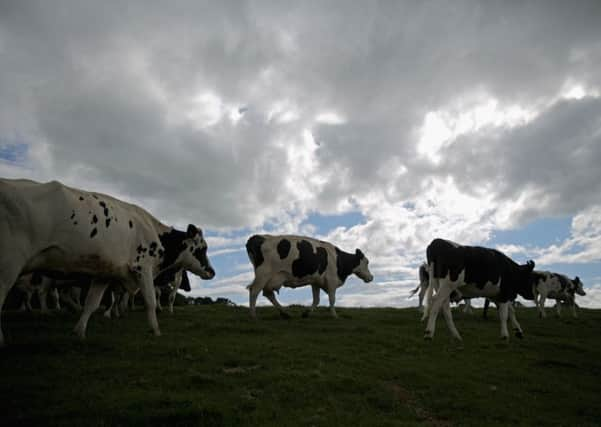Leaders: Action is needed for future of UK food


The obesity crisis is an unfortunate demonstration that in 2015 we want for nothing, other than the awareness to make the right decisions. Debate over “food security” is a matter for other, less fortunate countries.
Unless we are hit by fairly cataclysmic circumstances, there is no prospect of the food supply running out in the UK. Where we do have reason to be concerned is over the availability of British-produced food. The National Farmers Union south of the Border warned yesterday that crisis within the industry could put members out of business, leaving us to rely on imported foods instead.
Advertisement
Hide AdAdvertisement
Hide AdThe public has had some notice of farmers’ discontent, with the price of a pint of milk the subject of protests at supermarkets because it costs more to produce a pint of milk than it is sold for.
Milk isn’t the only issue, with arable and lamb farmers also feeling the pressure. The NFU believes many face big decisions over whether to keep going.
In a free market, national boundaries count for little. If food can be imported and sold cheaper than British-produced food, it takes an unusually strong sense of national duty to “buy British” and pay over the odds for a basket of groceries. The main dangers of this situation, however, are that the economy takes a hit when British producers go out of business, and we have to rely on imports for an essential commodity. This is not a strong position to be in should transportation difficulties arise, for instance.
There is also the question of genetically modified crops, banned by the Scottish Government in favour of natural products. If the bulk of food has to be imported, there may be no choice on such matters.
“Rich” farmers have rarely commanded much public sympathy, but even the man in the street can see that the price of a pint of milk – down to under 25p – cannot be sustainable.
Supermarkets have a responsibility to ensure that their suppliers are looked after and are treated fairly, rather than being abused as prices are forced down on a loss-leader to get customers through the door. That game can only be played for so long, if the upshot of such a short-term strategy is that the supply dries up – milked to death, literally.
Farming unions are calling for government help to find solutions. Action should be a priority – and it may have to be direct – because it is in the interests of all parties to protect the long-term future of the British food industry.
GP’s role is losing its lustre
A SURVEY which suggests that three out of ten of Scotland’s GPs would choose a different career path if they had to do it all again should ring alarm bells at the Scottish Government. The finding comes on the back of a report that up to a third of the country’s GPs want to retire in the next five years.
Advertisement
Hide AdAdvertisement
Hide AdThe position of general practitioner has always been coveted and respected, and relatively well rewarded. In the range of professions the schoolchild might be encouraged to consider, doctor is pretty much up there with the best of them.
However, that rating is on the wane, with rising dissatisfaction in the profession being attributed to an increased workload which is described as “unmanageable”. By definition, this means that GPs are unable to do their jobs adequately. Considering these are people who face life-and-death situations and decisions every day, this is an unacceptable position to be in. It is no way to treat the people who are the crucial first point of contact when it comes to looking after the nation’s health, and it is not doing much for public confidence either.
The Scottish Government appears to have acknowledged there are problems, with £60 million being invested in primary care over the next three years. But this is not a problem that can just have money thrown at it to provide a fix. The investment must be allocated carefully, in tandem with a proper assessment of what we expect from our GPs against what they are able to give us.
There is already worrying
evidence of problems over the recruitment and retention of GPs, as the job loses its lustre. If this symptom is not brought under control, the long-term prognosis becomes dire.